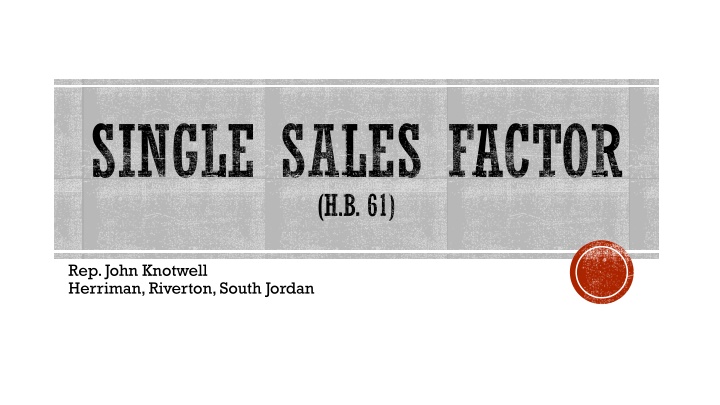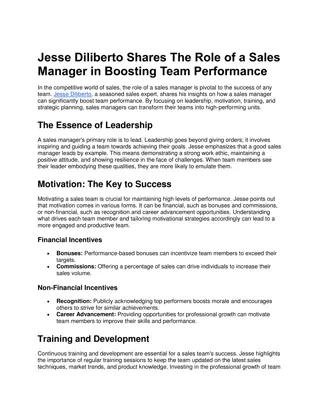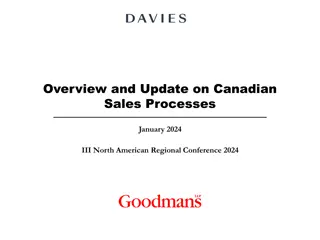SINGLE SALES FACTOR
The Single Sales Factor (H.B. 61) proposed by Rep. John Knotwell aims to reform corporate income tax apportionment in Utah. This strategy entails a shift towards taxing corporate income solely based on the percentage of sales made within the state, benefiting companies with a majority of their payroll and property outside Utah. Understand the implications and potential impacts of this tax reform to make informed decisions regarding Utah's economic competitiveness.
Download Presentation

Please find below an Image/Link to download the presentation.
The content on the website is provided AS IS for your information and personal use only. It may not be sold, licensed, or shared on other websites without obtaining consent from the author.If you encounter any issues during the download, it is possible that the publisher has removed the file from their server.
You are allowed to download the files provided on this website for personal or commercial use, subject to the condition that they are used lawfully. All files are the property of their respective owners.
The content on the website is provided AS IS for your information and personal use only. It may not be sold, licensed, or shared on other websites without obtaining consent from the author.
E N D
Presentation Transcript
SINGLE SALES FACTOR (H.B. 61) Rep. John Knotwell Herriman, Riverton, South Jordan
SINGLE SALES FACTOR EXPLAINED Alternate corporate income tax apportionment strategy (not a tax cut) Triple weight system: Percentage of nationwide property, sales and payroll (located in a state) is taxed equally (33.3% each) Double weight system: Double weight in sales (50%) and equal weight to the remaining two factors (payroll and property) Single Sales Factor: 100% corporate income tax based on percentage of sales in the state. Single Sales Factor benefits companies with majority payroll and property in Utah while shipping majority products out of state Single Sales Factor will not benefit companies with majority payroll and property in Utah and shipping most products within Utah.
WHY SSF? WORLDWIDE Economy Utah is competing with China, India, eastern Europe, Latin America, etc. Other States Utah is competing with states with much larger budgets to offer larger incentives Capital Investment Capital investment follows the path of least resistance. It only goes where it is wanted. Capital brings stickiness to its benefactor (Utah). Once the first state did it, it is inevitable in some parts of our economy Already used in Utah We have history in our state of its effectiveness
H.B. 61 CORPORATE FRANCHISE AND INCOME TAX CHANGES Initial approach: All tax filers = $138M immediate impact to education budget Substitute Add an additional industry classification to the existing SSF code Approximately 300 companies could qualify Electable Dynamic Fiscal Impact Roughly 2 years, +$24M to Education Fund, +$16M to General Fund, $1-$4 Billion in capital investment into our economy Industry Classification High Tech Manufacturing High Paying Jobs Immediate impacts to our state and local economy Proven success
WHATS NEXT? Evaluate the current system is it working? Electable or Mandated More industry classifications























